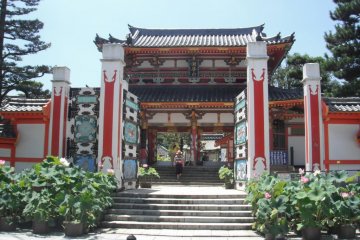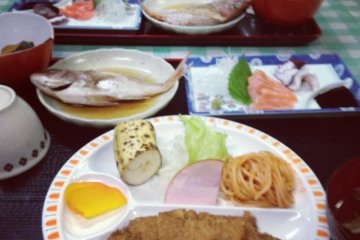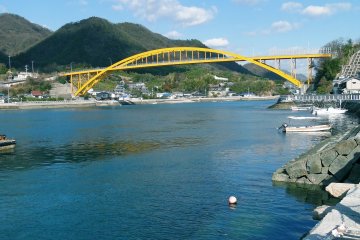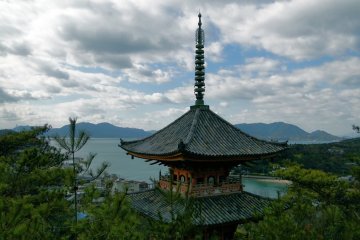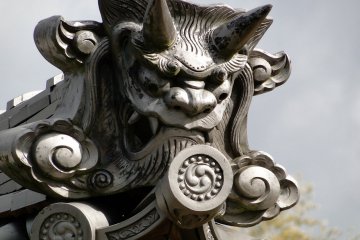Setoda-cho is on an island in the Seto-inland sea in the Onomichi area of Hiroshima. You can easily access the Setoda area by car, bus, ferry (from Mihara or Onomichi) or by bicycle following the Shimanami-kaido route over the bridges connecting the islands in this area.
The area is famous for its stunning scenery of the Seto-inland sea, impressive bridges that connect all the nearby islands as well as the many citrus groves that cover the hillsides. There are some famous artists and writers that grew up in this area, not to mention the numerous temples and shrines worth exploring.
The local people are also friendly, what they may lack in ability to communicate in English is quickly overcome by their desire to make you feel welcome conveyed with a smile or by pointing out an area of interest for you to have a look at. There are many reasons to keep you coming back to this area again and again.
Starting out through the village, head down to the water along the portside enjoying views of the Seto-inland sea with its bright contrasting yellow Konejima Bridge. Setoda was an important shipping port especially for trading Salt at the end of the Muromachi era (1392-1573).
A local hero, Hirayama Ikuo, was a famous artist and painter who is well known around the world as a survivor of the Hiroshima blast. He survived the bombing and later travelled the world sketching and painting what he encountered along the Silk Road route like Marco Polo. Hirayama was a goodwill ambassador for UNESCO and often said he was greatly influenced by the Setoda area where he grew up. Thanks to this area, Hirayama said no matter where he went, he would always find the views of the mountains, sea, forest and temples most fascinating in his life. You can see Hirayama's house and sketching spots marked around Setoda.
Kojoji temple and its 3 tiered pagoda offers a beautiful perspective of the area. Walking down the other side, you wander through citrus orchards of many types- when we were there, it was harvesting time for mikan mandarin oranges and the many other varieties of citrus fruits that are locally grown here. We made our way to Kofukuji temple where we were treated to citrus filled hot foot baths, Za-Zen meditation and a vegetarian monk's lunch. The footbath was a real treat after walking around the village and hiking up to the pagoda.
In the town, you can find a sushi shop and a kissaten, Japanese style coffee shop, serving dishes like pilaf and curry & rice all day. There is also a famous meat koroke (deep fried meat and potato pie) shop which was very popular. There is also a gelato ice-cream shop near the museum that is highly recommended. Citrus fruit sellers, dried seafood vendors, lemon cookies & cakes souvenir shops, bakeries as well as pottery, art and other quaint little shops are dotted around town.
Don't miss the Hirayama art museum. There are many great paintings of Ikuo Hirayama's here to enjoy, a bit of explanation in English, a pleasant coffee shop as well as very nice postcards and art gifts in the museum shop.
Other famous sights include Kosanji-temple with its strange and interesting temple and expansive grounds that lead up to a while marble exhibit called Mirashin No Oka "Hill of Hope" which was created out of the finest Italian marble by sculptor Kazuto Kuetani. The area is completely bizarre (some argue it is "cheesy") yet impressive and there are many stunning views of the inland sea and surrounding mountains from this area.
Many people who spend time in this area would argue that Setoda is one of their favorite places in the Chugoku region. The numerous citrus groves and splendid scenery (not to mention bargain prices of mikan, oranges and lemons) are all attractive features of the place.
There has been so much effort put into tourism here, the locals are friendly, welcoming and enjoy a slower pace of life which soon rubs off on visitors. Crossing the many beautiful bridges that take us back to Hiroshima was a beautiful way to end an interesting, fun-filled day. There is so much to explore in this area, it is somewhere you can find many new and interesting adventures while escaping big city life. It may take a little effort to get there, but you may find it harder to leave.



